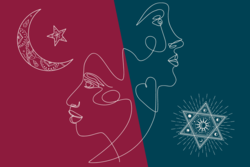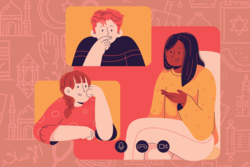The Intricacies of Queer, Interfaith Relationships
My girlfriend hasn’t spoken to her mom in maybe a year, and now her mom is moving back to her home country. So my girlfriend agreed: her mom could come and visit us and say goodbye.
In some ways, it’s hard to have parents who call you every day, multiple times a day, begging you to come or stay home. My dad (raised Muslim, like my girlfriend’s parents) does this just like my girlfriend's mom. I call him once or twice a day, every day. The world is a big and scary place for children, so some parents want to make it as small and as soft as possible. Or, they want you where they can see you—so they can control just enough to keep you out of harm’s way, even if they’re doing the harm. Sometimes parents ask you to be someone or something you don’t want to be; they vacillate between lucidity and lunacy; they move between abuse and adoration. Sometimes, when you make the best decision for yourself—moving out, coming out, going out—you feel like you’re hurting them.
I empathize with my dad, and my girlfriend’s mom. To Americans, especially, the invitation to live with our parents into adulthood—the arranged marriages, the emotional trainwrecks, and the daily check-ins—may seem like overprotective or controlling behavior. The worst part of navigating this growing up was feeling that, in processing the abuse and toxicity I was witnessing and experiencing, I was confirming others’ ethnic or Islamophobic prejudice. I didn’t want to have to choose between loving and understanding my family while also wanting them to change for the better. With my partner, I didn’t have to. Even though our familial relationships are complicated, it’s for us to sort through with our families, with the full knowledge of the places they’ve come from and how those places have affected them. It’s not easy for us to cut our families off and just move on.
When her mom arrived, I loved her sense of style. She pulled up in a car with my girlfriend’s sister and a trunk so full of traditional food that we had to wheel it in a wagon all the way to the elevator, and then painstakingly puzzle piece it into our freezer. We finished her last plastic tub of heaven just last month, and she visited four months ago.
Before her arrival, we chopped up fresh fruit, made a plate of nuts, chocolate, and set out tiny leopard-print Turkish coffee cups, as is our custom. She baby-talked at our kitten, calling it her granddaughter. When I held out her shoes so she could slip them on and head outside for a cigarette break, she said in her birdsong accent, “Wow, you know our culture!” She chatted with us about her recent cosmetic procedures (lip blushing and eyebrow tattooing) and swooned over all of our books.
Twenty-five years ago, my mom, an American Jew, married a Muslim man who had immigrated to the US two years prior. His experience in her world was one of racism and Islamophobia, and her experience in his world was one of antisemitism, no matter how much each tried to fit in. I was on the receiving end of both growing up. Twenty-five years into their tumultuous marriage, some things feel settled, and some things still hurt in the marrow of my memory, no matter how much I love my families.
So, yeah, I was afraid to meet my girlfriend’s mom. Not just because of the interfaith aspect. My girlfriend is a woman of trans experience. I wanted to avoid misgendering her in front of her mom, while not bringing up her gender nonconformity (and my own—hello dyke) during a fragile period of first impressions and agonizing goodbyes.
I had a feeling my girlfriend’s mom might be antisemitic; it’s been par for the course in my experience of my Muslim community, the same way racism and Islamophobia are in my Jewish one. She pored over the books I had bought about the Jewish community of her region, and was not upset at all that her child was in a committed, long term relationship with a Jewish woman. “In our region, sometimes, they marry Jews so they don’t have to pay a dowry,” she said, and my partner and I started blushing. “None of that here! Don’t worry, don’t worry honey. You’ll get a dowry.”
The whole experience was completely surreal. Each of us —my partner, my partner’s sister, and I—felt that we were in a sitcom episode. I still don’t know how to feel about it, but knowing that my partner and I discussed exactly how we wanted to proceed with the meeting gave me some comfort. We approached the meeting in a way that allowed her to see her mom while not having me misgender her or see her in any way she didn’t want to be seen. For those few hours, she was being referred to by at least three different names and didn’t miss a beat.
Not only did her mom not judge our shared bed and living arrangements, but she was also completely fine with me being Jewish. I knew there would be a learning curve, though, because there is always something to learn about a culture you were not raised with. It was the first time I’d hung out with “other Muslims” and not felt stressed about being Jewish. My girlfriend’s mom recognized me wholly as a Jewish woman and as a woman of her same culture. I had nothing to prove. I was enough. She wasn’t even upset that her daughter was practicing Judaism with me.
I realized that there wasn’t something innate to my communities that made them treat people in interfaith relationships in a negative way. It is the result of cumulative choices made by individuals informed by centuries of societal norms and stubborn theologies which create a trend. Same as any kind of prejudice—against inter-ethnic or inter-racial marriage and LGBTQ relationships.
We ordered Chinese food. She kissed me on both of my cheeks. Before she left, she said she could rest easy knowing someone was taking care of her child—that she wasn’t alone in the world. It fucking sucked. And it was also great. It all mingles together. We’ll remember the moment, laughing about something her mom said, then instantly grow sad, because that same mom doesn’t know all of who we are. And now she’s two continents and an ocean away.
If you, reader, are a traditional, religious parent of an LGBTQ+ child, your child’s orientation and gender are only a death sentence if you want them to be.
There will always be someone in the world that thinks your child is their world. You don’t need to be afraid that your child being trans or gay means that they are doomed to loneliness, poor health, or death. Your choice to support your child is the most effective difference between the best and worst life she could live—one where someone is getting a dowry ready for her, too.






